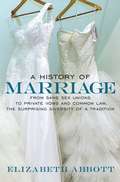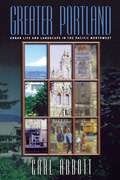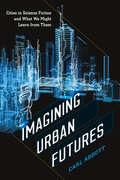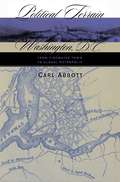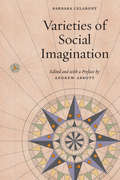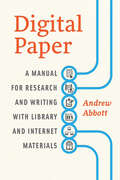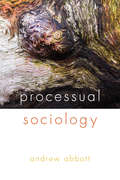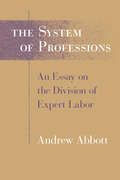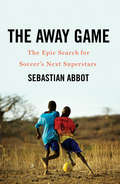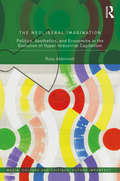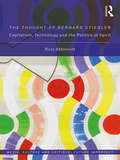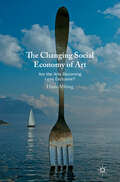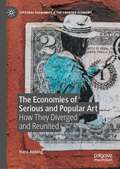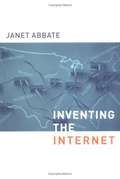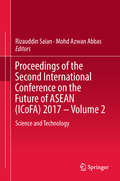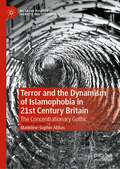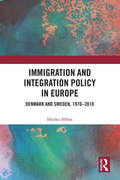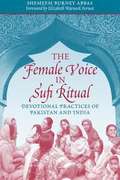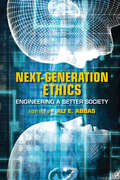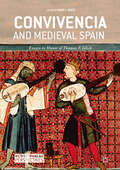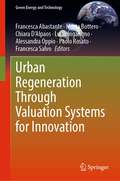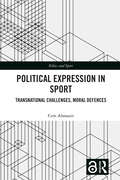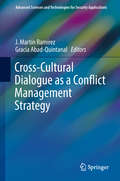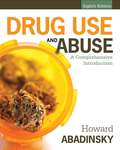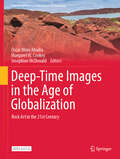- Table View
- List View
A History of Marriage: From Same Sex Unions to Private Vows and Common Law, the Surprising Diversity of a Tradition
by Elizabeth AbbottWhat does the "tradition of marriage" really look like? In A History of Marriage, Elizabeth Abbott paints an often surprising picture of this most public, yet most intimate, institution. Ritual of romance, or social obligation? Eternal bliss, or cult of domesticity? Abbott reveals a complex tradition that includes same-sex unions, arranged marriages, dowries, self-marriages, and child brides. Marriage--in all its loving, unloving, decadent, and impoverished manifestations--is revealed here through Abbott's infectious curiosity.
Greater Portland: Urban Life and Landscape in the Pacific Northwest
by Carl AbbottSelected by Choice magazine as an Outstanding Academic Title for 2001<P><P> It has been called one of the nation's most livable regions, ranked among the best managed cities in America, hailed as a top spot to work, and favored as a great place to do business, enjoy the arts, pursue outdoor recreation, and make one's home. Indeed, years of cooperative urban planning between developers and those interested in ecology and habitability have transformed Portland from a provincial western city into an exemplary American metropolis. Its thriving downtown, its strong neighborhoods, and its pioneering efforts at local management have brought a steady procession of journalists, scholars, and civic leaders to investigate the "Portland style" that values dialogue and consensus, treats politics as a civic duty, and assumes that it is possible to work toward public good.Probing behind the press clippings, acclaimed urban historian Carl Abbott examines the character of contemporary Portland--its people, politics, and public life--and the region's history and geography in order to discover how Portland has achieved its reputation as one of the most progressive and livable cities in the United States and to determine whether typical pressures of urban growth are pushing Portland back toward the national norm.In Greater Portland, Abbott argues that the city cannot be understood without reference to its place. Its rivers, hills, and broader regional setting have shaped the economy and the cityscape. Portlanders are Oregonians, Northwesteners, Cascadians; they value their city as much for where it is as for what it is, and this powerful sense of place nurtures a distinctive civic culture. Tracing the ways in which Portlanders have talked and thought about their city, Abbott reveals the tensions between their diverse visions of the future and plans for development.Most citizens of Portland desire a balance between continuity and change, one that supports urban progress but actively monitors its effects on the region's expansive green space and on the community's culture. This strong civic participation in city planning and politics is what gives greater Portland its unique character, a positive setting for class integration, neighborhood revitalization, and civic values. The result, Abbott confirms, is a region whose unique initiatives remain a model of American urban planning.
Imagining Urban Futures: Cities in Science Fiction and What We Might Learn from Them
by Carl AbbottCarl Abbott, who has taught urban studies and urban planning in five decades, brings together urban studies and literary studies to examine how fictional cities in work by authors as different as E. M. Forster, Isaac Asimov, Kim Stanley Robinson, and China Miéville might help us to envision an urban future that is viable and resilient. Imagining Urban Futures is a remarkable treatise on what is best and strongest in urban theory and practice today, as refracted and intensely imagined in science fiction. As the human population grows, we can envision an increasingly urban society. Shifting weather patterns, rising sea levels, reduced access to resources, and a host of other issues will radically impact urban environments, while technology holds out the dream of cities beyond Earth. Abbott delivers a compelling critical discussion of science fiction cities found in literary works, television programs, and films of many eras from Metropolis to Blade Runner and Soylent Green to The Hunger Games, among many others.
Political Terrain
by Carl AbbottWashington, D.C., President John F. Kennedy once remarked, is a city of "southern efficiency and northern charm." Kennedy's quip was close to the mark. Since its creation two centuries ago, Washington has been a community with multiple personalities. Located on the regional divide between North and South, it has been a tidewater town, a southern city, a coveted prize in fighting between the states, a symbol of a reunited nation, a hub for central government, an extension of the Boston-New York megalopolis, and an international metropolis.In an exploration of the many identities Washington has taken on over time, Carl Abbott examines the ways in which the city's regional orientation and national symbolism have been interpreted by novelists and business boosters, architects and blues artists, map makers and politicians. Each generation of residents and visitors has redefined Washington, he says, but in ways that have utilized or preserved its past. The nation's capital is a city whose history lives in its neighborhoods, people, and planning, as well as in its monuments and museums.
Varieties of Social Imagination
by Andrew Abbott Barbara CelarentIn July 2009, the American Journal of Sociology (AJS) began publishing book reviews by an individual writing as Barbara Celarent, professor of particularity at the University of Atlantis. Mysterious in origin, Celarent’s essays taken together provide a broad introduction to social thinking. Through the close reading of important texts, Celarent’s short, informative, and analytic essays engaged with long traditions of social thought across the globe—from India, Brazil, and China to South Africa, Turkey, and Peru. . . and occasionally the United States and Europe. Sociologist and AJS editor Andrew Abbott edited the Celarent essays, and in Varieties of Social Imagination, he brings the work together for the first time. Previously available only in the journal, the thirty-six meditations found here allow readers not only to engage more deeply with a diversity of thinkers from the past, but to imagine more fully a sociology—and a broader social science—for the future.
Digital Paper: A Manual for Research and Writing with Library and Internet Materials (Chicago Guides to Writing, Editing, and Publishing)
by Andrew AbbottToday’s researchers have access to more information than ever before. Yet the new material is both overwhelming in quantity and variable in quality. How can scholars survive these twin problems and produce groundbreaking research using the physical and electronic resources available in the modern university research library? In Digital Paper, Andrew Abbott provides some much-needed answers to that question. Abbott tells what every senior researcher knows: that research is not a mechanical, linear process, but a thoughtful and adventurous journey through a nonlinear world. He breaks library research down into seven basic and simultaneous tasks: design, search, scanning/browsing, reading, analyzing, filing, and writing. He moves the reader through the phases of research, from confusion to organization, from vague idea to polished result. He teaches how to evaluate data and prior research; how to follow a trail to elusive treasures; how to organize a project; when to start over; when to ask for help. He shows how an understanding of scholarly values, a commitment to hard work, and the flexibility to change direction combine to enable the researcher to turn a daunting mass of found material into an effective paper or thesis. More than a mere how-to manual, Abbott’s guidebook helps teach good habits for acquiring knowledge, the foundation of knowledge worth knowing. Those looking for ten easy steps to a perfect paper may want to look elsewhere. But serious scholars, who want their work to stand the test of time, will appreciate Abbott’s unique, forthright approach and relish every page of Digital Paper.
Processual Sociology
by Andrew AbbottFor the past twenty years, noted sociologist Andrew Abbott has been developing what he calls a processual ontology for social life. In this view, the social world is constantly changing--making, remaking, and unmaking itself, instant by instant. He argues that even the units of the social world--both individuals and entities--must be explained by these series of events rather than as enduring objects, fixed in time. This radical concept, which lies at the heart of the Chicago School of Sociology, provides a means for the disciplines of history and sociology to interact with and reflect on each other. In Processual Sociology, Abbott first examines the endurance of individuals and social groups through time and then goes on to consider the question of what this means for human nature. He looks at different approaches to the passing of social time and determination, all while examining the goal of social existence, weighing the concepts of individual outcome and social order. Abbott concludes by discussing core difficulties of the practice of social science as a moral activity, arguing that it is inescapably moral and therefore we must develop normative theories more sophisticated than our current naively political normativism. Ranging broadly across disciplines and methodologies, Processual Sociology breaks new ground in its search for conceptual foundations of a rigorously processual account of social life.
The System of Professions: An Essay on the Division of Expert Labor
by Andrew AbbottIn The System of Professions Andrew Abbott explores central questions about the role of professions in modern life: Why should there be occupational groups controlling expert knowledge? Where and why did groups such as law and medicine achieve their power? Will professionalism spread throughout the occupational world? While most inquiries in this field study one profession at a time, Abbott here considers the system of professions as a whole. Through comparative and historical study of the professions in nineteenth- and twentieth-century England, France, and America, Abbott builds a general theory of how and why professionals evolve.
The Away Game: The Epic Search For Soccer's Next Superstars
by Sebastian AbbotThe gripping story of a group of boys discovered in what may be the largest talent search in sports history. Over the past decade, an audacious program called Football Dreams has held tryouts for millions of 13-year-old boys across Africa looking for soccer’s next superstars. Led by the Spanish scout who helped launch Lionel Messi’s career at Barcelona and funded by the desert kingdom of Qatar, the program has chosen a handful of boys each year to train to become professionals—a process over a thousand times more selective than getting into Harvard. In The Away Game, reporter Sebastian Abbot follows a small group of the boys as they are discovered on dirt fields across Africa, join the glittering academy in Doha where they train, and compete for the chance to gain fame and fortune at Europe’s top clubs. We meet Diawandou, a skilled Senegalese defender whose composure makes him a natural leader on the field; Hamza, a midfielder from Ghana with great talent but a mercurial personality to match; Ibrahima, a towering striker who scores goals by the bucketload; Serigne Mbaye, who glides by players effortlessly but happens to be deaf; and Bernard, often the smallest kid on the field but a sublime playmaker who invites constant comparison to Messi. Abbot masterfully weaves together the dramatic story of the boys’ journey with an exploration of the art and science of trying to spot talent at such a young age. As in so many other sports, data analytics in soccer have expanded in the wake of Moneyball, with scouts employing more sophisticated metrics like "expected goals" and tracking data to judge players. But, as The Away Game chronicles, soccer genius depends more on intangible qualities like "game intelligence" than on easily quantifiable ones. Richly reported and deeply moving, The Away Game is set against the geopolitical backdrop of Qatar’s rise from an impoverished patch of desert to an immensely rich nation determined to buy a place on the international stage. It is an unforgettable story of the joy and pain these talented African boys experience as they chase their dreams in a dizzying world of rich Arab sheikhs, money-hungry agents, and soccer-mad European fans.
The Neoliberal Imagination: Politics, Aesthetics, and Economics in the Evolution of Hyper-Industrial Capitalism (Media, Culture and Critique: Future Imperfect)
by Ross AbbinnettThis book presents a polemical account of the historical development of the neoliberal imagination. Inspired by the thought of Frederic Jameson, Bernard Stiegler, and Timothy Morton, it argues that the evolution of virtual and information technologies has transformed the ideological imaginary of capitalism. Owing to the inseparability of the process of commodification from developments in the sphere of media technology – particularly the rise of the digital networks through which information is processed and disseminated – the aesthetic forms of the neoliberal imaginary are not external to the accelerated productivity and adaptability of human beings. Rather, they are essential both to the vision of progress that informs the technoscientific organization of capitalist society and to the practical formation of ‘the self’ that takes place within its networks. A snapshot of the evolving ‘world picture’ that is formed in the neoliberal imagination as articulated in its particular regime of capitalization, The Neoliberal Imagination will appeal to scholars of social theory and social philosophy with interests in neoliberalism.
The Thought of Bernard Stiegler: Capitalism, Technology and the Politics of Spirit (Media, Culture and Critique: Future Imperfect)
by Ross AbbinnettThis book provides a comprehensive account of the work of Bernard Stiegler, one of the most influential living social and political philosophers of the twenty-first century. Focusing on Stiegler’s thought on hyperindustrial society and the development of technological systems through which the social, economic and political life of human beings has been transformed, the author examines Stiegler’s claim that the human species is ‘originally technological’ and that to understand the evolution of human society, we must first understand the interface between human beings and technology. A study of the reciprocal development of technical instruments and human faculties, that offers a chapter-by-chapter account of how this relationship is played out in the digital, informatic and biotechnological programmes of hyperindustrial society, The Thought of Bernard Stiegler develops Stiegler’s idea of technology as a pharmakon: a network of systems that provoke both existential despair and unprecedented modes of aesthetic, literary and philosophical creativity that can potentially revitalize the political culture of human beings. As such, it will appeal to social and political theorists and philosophers concerned with our postmodern inheritance.
The Changing Social Economy of Art: Are the Arts Becoming Less Exclusive?
by Hans AbbingIs art for everybody? Why do art lovers attach so much value to authenticity, autonomy and authorship? Why did the arts become so serious in the first place? Why do many artists reject commerce and cultural entrepreneurship? Crucially, are any of the answers to these questions currently changing? Hans Abbing is uniquely placed to answer such questions, and, drawing on his experiences as an economist and sociologist as well as a professional artist, in this volume he addresses them head on. In order to investigate changes in the social economy of the arts, Abbing compares developments in the established arts with those in the popular arts and proceeds to outline key ways that the former can learn from the latter; by lowering the cost of production, fostering innovation, and becoming less exclusive. These assertions are contextualized with analysis of the separation between serious art and entertainment in the nineteenth century, lending credence to the idea that government-supported art worlds have promoted the exclusion of various social groups. Abbing outlines how this is presently changing and why, while the established arts have become less exclusive, they are not yet for everybody.
The Economies of Serious and Popular Art: How They Diverged and Reunited (Cultural Economics & the Creative Economy)
by Hans AbbingCombining an economic perspective with sociological and historic insights, this book investigates the separation of ‘popular’ and ‘serious’ art over a period of almost two centuries. As the boundaries between our perceptions of established art and popular become more porous, Abbing considers questions such as: Who benefitted from the separation? Why is exclusivity in the established arts so important? Did exclusivity lead to high cost, high subsidies and high prices? Were and are underprivileged groups excluded from art consumption and production? How did popular music become so successful in the second half of the twentieth century? Why does the art profession remain extraordinarily attractive for youngsters in spite of low incomes? The book also discusses the evolution of art in the twenty-first century, considering for example how the platform economy affects the arts, whether or not the established arts are joining the entertainment industry, and the current level of diversity in art. Written from the dual perspective of the author as an artist and social scientist, the book will be of interest for cultural economists and academics as well as artists and general readers interested in art.
Inventing the Internet
by Janet AbbateSince the late 1960s the Internet has grown from a single experimental network serving a dozen sites in the United States to a network of networks linking millions of computers worldwide. In Inventing the Internet, Janet Abbate recounts the key players and technologies that allowed the Internet to develop; but her main focus is always on the social and cultural factors that influenced the Internets design and use. The story she unfolds is an often twisting tale of collaboration and conflict among a remarkable variety of players, including government and military agencies, computer scientists in academia and industry, graduate students, telecommunications companies, standards organizations, and network users. The story starts with the early networking breakthroughs formulated in Cold War think tanks and realized in the Defense Department's creation of the ARPANET. It ends with the emergence of the Internet and its rapid and seemingly chaotic growth. Abbate looks at how academic and military influences and attitudes shaped both networks; how the usual lines between producer and user of a technology were crossed with interesting and unique results; and how later users invented their own very successful applications, such as electronic mail and the World Wide Web. She concludes that such applications continue the trend of decentralized, user-driven development that has characterized the Internet's entire history and that the key to the Internet's success has been a commitment to flexibility and diversity, both in technical design and in organizational culture.
Proceedings of the Second International Conference on the Future of ASEAN (ICoFA) 2017 – Volume 2: Science And Technology
by Mohd Azwan Abbas Rizauddin SaianThis book examines how business, the social sciences, science and technology will impact the future of ASEAN. Following the ASEAN VISION 2020, it analyses the issues faced by ASEAN countries, which are diverse, while also positioning ASEAN as a competitive entity through partnerships. On the 30th anniversary of ASEAN, all ASEAN leaders agreed to the establishment of the ASEAN VISION 2020, which delineates the formation of a peaceful, stable and dynamically developed region while maintaining a community of caring societies in Malaysia, Indonesia, Singapore, Brunei, Vietnam, Thailand, the Philippines, Myanmar, Laos and Cambodia. In keeping with this aspiration, Universiti Teknologi MARA Perlis took the initial steps to organise conferences and activities that highlight the role of the ASEAN region. The Second International Conference on the Future of ASEAN (ICoFA) 2017 was organised by the Office of Academic Affairs, Universiti Teknologi MARA Perlis, to promote more comprehensive integration among ASEAN members. This book, divided into two volumes, offers a useful guide for all those engaged in research on business, the social sciences, science and technology. It will also benefit researchers worldwide who want to gain more knowledge about ASEAN countries
Terror and the Dynamism of Islamophobia in 21st Century Britain: The Concentrationary Gothic (Palgrave Politics of Identity and Citizenship Series)
by Madeline-Sophie AbbasThis book provides powerful insights into the dynamics, nature, and experiences of the terrors of counter-terrorism measures in the UK. Abbas links her analysis to wider concerns of nation construction and belonging; racial profiling and policing; the state of exception and pre-emptive counter-terrorism measures; community-based counter-terrorism measures; and restrictions to political engagement, freedom of speech and hate speech. What makes this work distinct is its advancement of an original framework - the Concentrationary Gothic - to delineate the racialised mechanisms of terror involved in the governance of Muslim populations in the ‘war on terror’ context. The book illuminates the various ways in which Muslims in Britain experience terror through racialised surveillance and policing strategies operating at state, group (inter- and intra-), and individual levels in diverse contexts such as the street, workplace, public transport and the home. Abbas situates these experiences within wider racial politics and theory, drawing connections to anti-Semitism, anti-blackness, anti-Irishness and whiteness, to provide a complex mapping of the ways in which racial terror has operated in both historical and contemporary contexts of colonialism, slavery, and the camp, and offering a unique point of analysis through the use of Gothic tropes of haunting, monstrosity and abjection. This vital work will be of interest to students and scholars across sociology, criminology, anthropology, terrorism studies, Islamic studies, and critical Muslim studies, researching race and racialisation, security, immigration, nationhood and citizenship.
Immigration and Integration Policy in Europe: Denmark and Sweden, 1970–2010
by Haider AbbasThis book analyzes contemporary changes in immigration and integration policy in the wake of populism and rise of right-wing parties across the world. It examines how, in the face of substantial migratory flows, rising security concerns regarding immigration, and a refugee crisis of unprecedented levels, member states of the European Union have responded by calling for restrictive immigration policies, border patrolling, and intensified integration programs. Focusing on Denmark and Sweden, the volume employs a unified theoretical framework to look at how internal political debates, institutional patterns, constitutional frameworks, and political competition are key to a systematic explanation of immigration and integration policy changes in Europe. This volume will be of great interest to scholars and researchers of migration and diaspora studies, public policy, politics and international relations, sociology, and social anthropology, as well as government officials, think tanks, and policymakers.
The Female Voice in Sufi Ritual: Devotional Practices of Pakistan and India
by Abbas Shemeem BurneyThe female voice plays a more central role in Sufi ritual, especially in the singing of devotional poetry, than in almost any other area of Muslim culture. This research clarifies why the female voice is so important in Sufi practice and underscores the many contributions of women to Sufism and its rituals.
Next-Generation Ethics: Engineering a Better Society
by Ali E. AbbasMany of the significant developments of our era have resulted from advances in technology, including the design of large-scale systems; advances in medicine, manufacturing, and artificial intelligence; the role of social media in influencing behaviour and toppling governments; and the surge of online transactions that are replacing human face-to-face interactions. These advances have given rise to new kinds of ethical concerns around the uses (and misuses) of technology. This collection of essays by prominent academics and technology leaders covers important ethical questions arising in modern industry, offering guidance on how to approach these dilemmas. Chapters discuss what we can learn from the ethical lapses of #MeToo, Volkswagen, and Cambridge Analytica, and highlight the common need across all applications for sound decision-making and understanding the implications for stakeholders. Technologists and general readers with no formal ethics training and specialists exploring technological applications to the field of ethics will benefit from this overview.
Convivencia and Medieval Spain: Essays in Honor of Thomas F. Glick (Mediterranean Perspectives)
by Mark T. AbateThis volume is a collection of essays on medieval Spain, written by leading scholars on three continents, that celebrates the career of Thomas F. Glick. Using a wide array of innovative methodological approaches, these essays offer insights on areas of medieval Iberian history that have been of particular interest to Glick: irrigation, the history of science, and cross-cultural interactions between Jews, Christians, and Muslims. By bringing together original research on topics ranging from water management and timekeeping to poetry and women’s history, this volume crosses disciplinary boundaries and reflects the wide-ranging, gap-bridging work of Glick himself, a pivotal figure in the historiography of medieval Spain.
Urban Regeneration Through Valuation Systems for Innovation (Green Energy and Technology)
by Francesca Abastante Marta Bottero Chiara D’Alpaos Luisa Ingaramo Alessandra Oppio Paolo Rosato Francesca SalvoThis book examines the role of the evaluation models in decision-making processes for the construction of circular cities in the digital revolution. In particular, the book explores the need for a rethinking of development models proposed by the circular economy which requires the valorization of natural, social and economic capital. Urban environment represents a crucial field of analysis in which applying the circular-economy principles in order to steer a course towards a sustainable economy characterized by processes meant to create value instead of extracting it, which put a step forward in the pathway towards a better future in terms of economic, environmental and social effects and desirable outcomes. In this context, the design of urban regeneration processes and housing environments requires the adoption of inclusive analysis/assessment models combined with the structuring and organization of public/private investments that can contribute to creating positive natural and social impacts as well as economic and financial returns. This fundamental paradigm shift is accentuated in the current context, in which the digital revolution is reinventing the future and calls for a rethinking and reformulation of value systems in the era of technological process innovations, while respecting economic, natural and social ecosystems.
Political Expression in Sport: Transnational Challenges, Moral Defences (Ethics and Sport)
by Cem AbanazirThis powerful new book looks at how private institutions governing and organising sport restrict political expression. Uniquely, it makes a case for the freedom of expression for athletes, spectators and audiences built upon philosophical foundations. In the era of Colin Kaepernick and taking a knee, politics and protest in sport have never been more visible and immediate. Drawing on a wide range of international cases, including protest actions from athletes such as Tommie Smith and John Carlos, Naomi Osaka and Feyisa Lilesa, as well as the reactions from sport organisations including the IOC, FIFA, UEFA and the NFL, the book argues that the organisation of sport at the hands of associations and leagues and their transnational power to regulate, adjudicate and enforce matters according to their interests lead to the restriction of freedom of expression. Focusing on the individual, the book presents a framework for the defence of freedom of expression in sport on moral grounds and also explores the limits to freedom of expression, especially those arising from hate speech, that might better serve both the individual and sport as an institution. This book is fascinating reading for anybody with an interest in the ethics, philosophy or politics of sport, sport governance, the relationship between sport and wider society, or moral or political philosophy.
Cross-Cultural Dialogue as a Conflict Management Strategy (Advanced Sciences and Technologies for Security Applications)
by Gracia Abad-Quintanal J. Martín RamírezThis book contributes to the current knowledge and research on conflict and cross-cultural dialogue, emphasizing how respect, tolerance and dialogue may be quite effective tools for bridging the diverse cultures and, consequently, for solving many of the conflicts of today’s world, characterized by a dynamic interchange of populations with very diverse cultural and ethnic backgrounds. For this purpose, we rely on reputed scholars from ten different countries, and from different cultures and fields of expertise, which allows for diverse contributions from a valuable interdisciplinary perspective. The first section of the book deals with the correlation between cultural differences and conflict, while also showing how such conflicts can be prevented and, should they arise, managed and solved. The second section addresses a different, more specific issue: how cultural expression means and tools for cultural communication may lead to conflict whereas they may help to avoid it as well. Finally, the third section analyzes how legal and justice systems deal with cross-cultural conflicts as well as with situations which may lead to cross-cultural conflicts, thus assessing to which extent such systems contribute to avoid and/or solve such kind of conflicts.
Drug Use and Abuse: A Comprehensive Introduction (8th Edition)
by Howard AbadinskyPacked with the latest data and research, the powerful new DRUG USE AND ABUSE: A COMPREHENSIVE INTRODUCTION, 8e delivers a thorough, interdisciplinary survey of all aspects of drug and alcohol abuse. The text draws from the many disciplines of history, law, pharmacology, political science, social work, counseling, psychology, sociology, and criminal justice--resulting in the most comprehensive, authoritative single source available. It explores the history of drugs, their impact on society, the pharmacological impact of drugs on the body, drug policy implications, the criminal justice system response, the drug business, law enforcement, theories of use, as well as the effects, treatment, and prevention of abuse. New coverage includes nonmedical use of prescription drugs, synthetic substances, the use of stimulants to treat PTSD and ADD, medical marijuana, the connection between drug trafficking and terrorism, and an updated analysis of the United States drug policy.
Deep-Time Images in the Age of Globalization: Rock Art in the 21st Century (Interdisciplinary Contributions to Archaeology)
by Oscar Moro Abadía Margaret W. Conkey Josephine McDonaldThis open access volume explores the impact of globalization on the contemporary study of deep-time art. The volume explores how early rock art research’s Eurocentric biases have shifted with broadened global horizons to facilitate new conversations and discourses in new post-colonial realities. The book uses seven main themes to explore theoretical, methodological, ethical, and practical developments that are orienting the study of Pleistocene and Holocene arts in the age of globalization. Compiling studies as diverse as genetics, visualization, with the proliferation of increasingly sophisticated archaeological techniques, means that vast quantities of materials and techniques are now incorporated into the analysis of the world’s visual cultures. Deep-Time Images in the Age of Globalization aims to promote critical reflection on the multitude of positive – and negative – impacts that globalization has wrought in rock art research. The volume brings new theoretical frameworks as well as engagement with indigenous knowledge and perspectives from art history. It highlights technical, methodological and interpretive developments, and showcases rock art characteristics from previously unknown (in the global north) geographic areas. This book provides comparative approaches on rock art globally and scrutinises the impacts of globalization on research, preservation, and management of deep-time art. This book will appeal to archaeologists, social scientists and art historians working in the field as well as lovers of rock art.
